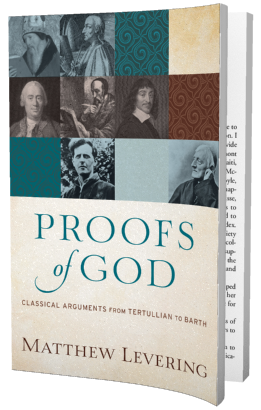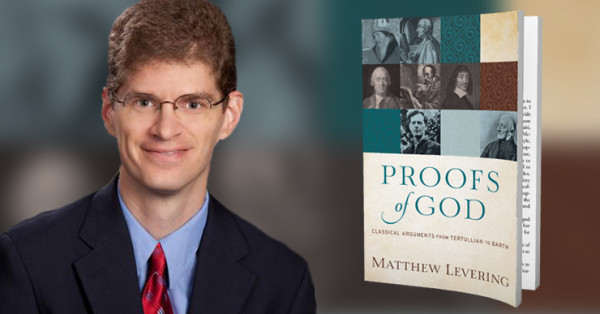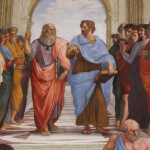Proofs of God: An Interview with Dr. Matthew Levering
by Brandon Vogt
Filed under Interviews, The Existence of God
In his newest book, Proofs of God: Classical Arguments from Tertullian to Barth (Baker Academic, 2016), leading theologian Matthew Levering presents a thoroughgoing critical survey of the proofs of God's existence for readers interested in traditional Christian responses to the problem of atheism.
Beginning with Tertullian and ending with Karl Barth, Levering covers twenty-one theologians and philosophers from the early church to the modern period, examining how they answered the critics of their day. He also shows the relevance of the classical arguments to contemporary debates and challenges to Christianity.
Today, I sit down with Dr. Levering to discuss some of the thinkers highlighted in his book and whether it's possible to actually prove God exists.
BRANDON: Let's start with a basic question. Why this book? And how would you classify it? Is it apologetics? Theological history? A little of both?
DR. MATTHEW LEVERING: I wrote this book because I know personally the pain of not merely not knowing whether God exists, but not knowing what the word 'God' is supposed to mean. For many people whom I knew during my childhood, 'God' has just as much meaning as 'the Great Pumpkin'. In case the reference needs explaining, in the 'Peanuts' comic strip authored by Charles Schultz, the character Linus believes fervently in the existence of the Great Pumpkin who each year, according to Linus, rewards the most sincere pumpkin patch by manifesting himself there. There is no way to disprove the existence of the Great Pumpkin, nor is there really any way to speak rationally about him—one either believes or one does not.
My view from experience is that many atheists see belief in God as precisely such a belief for which there is nothing rational to say. It is for this reason, I think, that serious discussion of whether or not God exists is now almost completely absent from elite universities, and is largely missing from the philosophy and theology departments of even many Catholic universities and colleges.
If one reads such publications as The New York Review of Books or other journals of elite culture, books that argue for the existence of God are generally not to be found, whereas a number of high-culture (and low-culture) figures weigh in with admiration of atheism. I notice that a number of recent high-culture books on death, for example, simply take it for granted that the universe is an absurdity and death an annihilation. Thus, it seemed important to examine the arguments for God's existence.
In my book, I examine the Western tradition of arguing for and against the possibility of demonstrating the existence of God. So I'd say that the book is neither apologetics nor theological history, because the goal of the book is to survey clearly and accurately the demonstrations (or counter-demonstrations) of God's existence set forth from 21 great thinkers, many of whom were philosophers.
In my introduction, I treat the Greco-Roman philosophical arguments about God, and then turn to the biblical witness (including Wisdom of Solomon and Romans). I then show that the first Christian theologians—the Fathers of the Church—were proponents of certain fundamental arguments for demonstrating the existence of God. I move from there through the centuries, treating not only proponents of the proofs but also philosophical critics such as William of Ockham, Michel de Montaigne, David Hume, Immanuel Kant, and Martin Heidegger.
The purpose is to encourage students of theology as well as educated readers in general to think seriously about this topic. And the purpose is also to show that belief in the existence of God is rationally justifiable
BRANDON: You titled your book Proofs of God. What do you mean by "proof"? Is it really possible to prove God exists?
 DR. LEVERING: When we think of 'proof', we often think of mathematics or of natural science. In these ways, of course, one cannot prove that God exists. But there are demonstrations that begin with the finite or limited modes of existence that we see around us, and then reflect upon what is needed in order to be able to account for the existence of finite things, both in themselves and in their orderly relations. I will not rehearse these arguments here, but they are quite powerful ones.
DR. LEVERING: When we think of 'proof', we often think of mathematics or of natural science. In these ways, of course, one cannot prove that God exists. But there are demonstrations that begin with the finite or limited modes of existence that we see around us, and then reflect upon what is needed in order to be able to account for the existence of finite things, both in themselves and in their orderly relations. I will not rehearse these arguments here, but they are quite powerful ones.
I show in the book that Montaigne and Hume have to rely upon an absolute skepticism—the view that our intellects simply cannot know what is real about things—in order to undermine the arguments for God's existence. Unfortunately, modern scientists such as Stephen Hawking and Richard Dawkins do not have any idea what the classical arguments for God's existence were, and they present these arguments in laughably ignorant ways.
Even a great thinker such as Immanuel Kant is cut off from the classical tradition and misrepresents it gravely, despite the fact that his skepticism about our ability to know anything in itself (as distinct from in our minds) would have meant that he would not have accepted the demonstrations. Kant, however, does argue that God's existence is necessary for the working of practical reason, and this argument is not as negligible as some might think, though it is certainly not the most persuasive path.
It should be said that the kind of demonstration of God's existence that succeeds does not define or 'comprehend' in an exhaustive sense: God always remains transcendent mystery, even though we can demonstrate that he exists.
BRANDON: Many people dismiss proofs like these because they attempt to prove only a thin slice of God, the God of "classical theism" or the so-called "God of the philosophers." But do some of the arguments prove more?
DR. LEVERING: To know rationally 'that God is'—namely that an infinite cause and source of all things exists, that sheer infinite To Be (something we cannot conceive) is at the root of everything finite—is to know the 'God of the philosophers'. This God is testified to in Scripture both in Wisdom 13 and Romans 1. In this sense, the 'God of the philosophers' is biblically attested. There is nothing wrong with knowing even a very little about God. It is actually quite exciting. So I wouldn't say that the demonstrations reach only a 'thin slice of God'. They reach the living God, since if there were a 'God' who is not infinite To Be (pure, unrestricted, simple actuality), such a 'God' would merely be another finite thing in the cosmos or multiverse of finite things.
The arguments do not establish a personal relationship between us and God, and so in this regard they are tantalizing but far from enough. If we knew that God existed but this God never reached out to us, never personally acted so as to make himself intimately known, we could only be in a state of deep frustration.
Fortunately, there is no reason to think that the 'God of the philosophers' is not also the living God who has revealed himself as supreme love and supreme mercy.
BRANDON: What can we know about God solely from reason? For what do we need revelation?
DR. MATTHEW LEVERING: We can know that God exists and that God is not composite in being or restricted in being in any way. God is infinite, perfect, the fullness of actuality and thus infinite wisdom, goodness, life, eternal presence, and so forth. We need revelation to know that God is one infinite 'essence' in three distinct Persons and thus is perfect communion, without ceasing to be supremely one (not 'one' among many, but 'one' as undivided). We need revelation to know that God the Trinity is the provident Creator who makes all things with the Incarnation as the guiding pole: that is to say, God the Trinity from the outset wills to draw creatures into union with his very own life of Trinitarian communion.
Humans are not meant to live apart from an unfathomably rich personal sharing in the divine life. The generosity of this God is utterly stunning. Even more so when we consider that we are 'bent' away from God, insofar as we often really don't want anything to do with God or with anything but a self-serving love that is not truly love at all. We sometimes imagine that the amazing vastness of space and time shows that 'God', if he exists, could not really care this much for us.
But what the vastness of space/time and the incalculable multiplicity of creatures actually confirms is the wondrous generosity of God; he loves so much into existence. Material existence requires material decomposition, but God has not made all this for everlasting nothingness. His love meets our personal yearning for communion—our yearning to be known and loved and to know and love—and goes further than we would ever be willing to go.
The universe superabundantly manifests the greatness of God, but so does the smallest human cry for interpersonal communion. The truth is that we are always underestimating God, because we try to measure God on our scale, when we can't even measure the universe or even the complexity of a living organism on our scale.
BRANDON: When Christians and atheists debate proofs for God, they often focus on a small group of prominent thinkers such as Plato, Aristotle, Augustine, Anselm, and Aquinas. But your book widens the discussion, offering a panoramic view that includes many other figures. Who are some of the thinkers who often get ignored in this discussion?
DR. LEVERING: The early Church Fathers deserve mention, because one sometimes finds an absurd dichotomy between (for example) the Greek East and the Latin West, or between the patristic period and the scholastic period, as though the latter in each pair had succumbed to rationalism. Indeed, Aquinas's best arguments are all found in Gregory of Nazianzus and John of Damascus, so it is a mistake to jump from Aristotle to Augustine and Aquinas. Sometimes the demonstrations of God's existence are thought to be a distinctively Thomist enterprise, and that is an error. If one is dealing with philosophical skepticism (i.e. in cases where the contention that we can know the real in itself is a non-starter), then Blaise Pascal and John Henry Newman provide helpful ways for getting out of the morass.
To my mind, it is important to actually know the arguments of Hume and Kant, especially Hume. One will then be able to see their weakness and the way in which they prop up the arguments of the more serious atheistic philosophers today.
BRANDON: In the book, you explore nearly two dozen approaches to proving God's existence. Which do you consider to be the strongest proof for God? What are some common objections to it?
DR. LEVERING: I think that Aquinas's five ways are the strongest proofs for God, but in saying this I should repeat that they are found already in the Greek Fathers. Objections to the five ways include the notion that 'being' is not real but rather is a mere predicate of an essence. To appreciate why Aquinas approaches 'being' as he does, one needs to consider two things: first, something cannot be and not be in the same way at the same time (this shows that 'being' refers to a reality not merely to a nominal predicate); second, the things we see around us are intrinsically analogous in their modes of being (a rock 'is' in a lesser way than a living tree, a tree 'is' in a lesser way than a living and self-moving frog, etc.). Aquinas's reflections on why finite things must have a non-finite source of their being are priceless, as are his reflections on the order found in non-rational things.
BRANDON: You don't just focus on theistic arguments in your book. You also cover major critics of these arguments such as David Hume. Why did Hume take issue with traditional arguments for God? Do his criticisms hold up?
DR. LEVERING: For an adequate presentation of Hume's views, I should point the reader to the book itself. But Hume's arguments depend upon denying that every effect has a cause. In Hume's opinion, we see effects that seem to have causes, but we have no grounds for extrapolating from this and deducing that all effects must have causes. Hume is aided in this opinion—which at bottom means that we know nothing about anything (radical skepticism) since all we know are the appearances of things—by a merely logical view of being, which allows him to get away with not analyzing what the deepest relationship of an effect to its cause involves.
BRANDON: You devote considerable space to thinkers in the nineteenth and twentieth centuries. In fact, you describe it as "disproportionate treatment...by comparison with the other eighteen centuries." What are some of the key proofs from this period?
DR. LEVERING: The great thinkers of the first eighteen centuries are fairly well identified, or at least representative figures can be chosen. But it is in the last two centuries that atheism and the response to atheism emerges in full force within mainstream culture. In the last century, furthermore, it became fashionable among theologians (Catholic and Protestant) to dismiss demonstrations of God's existence as wrongheaded and not helpful.
So I found it important to direct attention to a relatively wide array of perspectives from the last two centuries, including influential but forgotten Catholic perspectives (Maurice Blondel and Pierre Rousselot, who argue that Aquinas's five ways would be enhanced by starting not with mere finite things but with the experientially known dynamisms of volition and intellect). Heidegger, Wittgenstein, and Barth have been so incredibly influential among theologians that they had to be treated. Reginald Garrigou-Lagrange, though now generally seen as the pillar of a discredited preconciliar theology, restates Aquinas's five ways in a clear and intelligent way in critical dialogue with modern thinkers, and so he also deserved attention—especially since I think that the five ways remain the most persuasive paths.
BRANDON: What's the one message you hope readers take away from your book?
DR. LEVERING: God is worth thinking about. Don't be an atheist without pursuing every rational discussion of God, not with the goal of resolving all mystery but with the goal of testing the mind's true limits and the possibility that reality is greater than the empirical.

Related Posts
Note: Our goal is to cultivate serious and respectful dialogue. While it's OK to disagree—even encouraged!—any snarky, offensive, or off-topic comments will be deleted. Before commenting please read the Commenting Rules and Tips. If you're having trouble commenting, read the Commenting Instructions.













